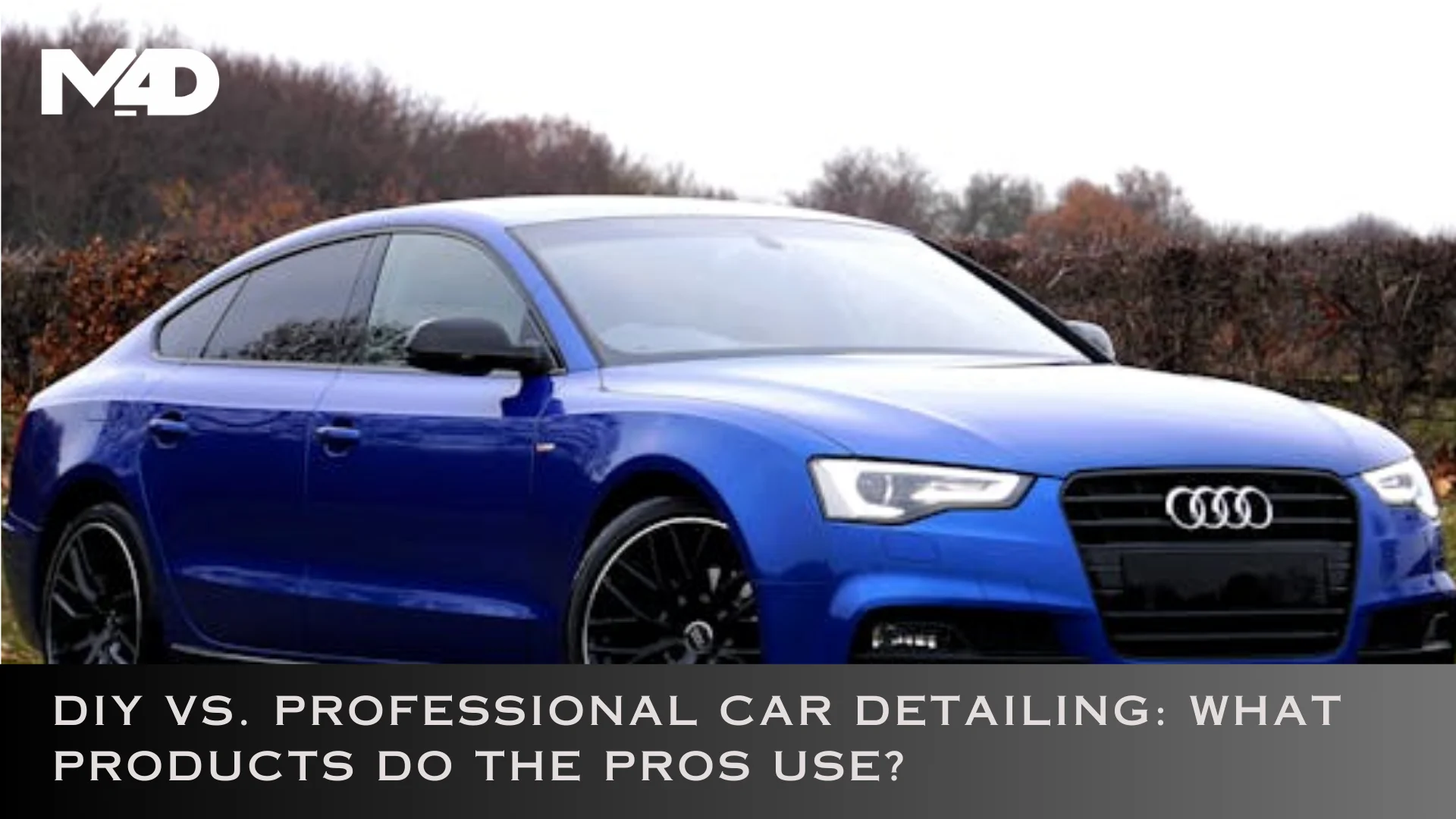DIY vs. Professional Car Detailing: What Products Do the Pros Use?

Introduction
When it comes to keeping your car looking pristine, car detailing is an essential part of the process. Whether you prefer to tackle the job yourself or hand it over to a professional, understanding the difference between DIY car detailing and professional services can help you make an informed decision. In this article, we’ll explore the ins and outs of both approaches, with a special focus on the products that professional detailers use to achieve that showroom shine.
Understanding Car Detailing
Before we dive into the specifics, let’s clarify what car detailing actually involves. Car detailing goes beyond a simple wash; it’s a thorough cleaning, restoration, and finishing process that revitalizes both the interior and exterior of your vehicle. While a regular car wash might remove surface dirt, detailing takes care of the finer details—literally.
Difference Between Cleaning and Detailing
A quick wash might make your car look clean, but detailing involves a much more comprehensive process. Detailing includes cleaning every nook and cranny, polishing the paint to remove minor scratches, applying protective waxes, and conditioning the interior to keep it looking fresh. It’s about bringing out the best in your car, from top to bottom.
DIY Car Detailing
For many car enthusiasts, DIY car detailing is a rewarding hobby. It allows you to take full control over how your car looks, and it can be a cost-effective way to keep your vehicle in great condition.
Benefits of DIY Car Detailing
One of the biggest advantages of DIY detailing is the sense of satisfaction you get from doing it yourself. You can take your time, focus on areas that need extra attention, and save money by not having to pay for professional services. Plus, there’s a wide range of products available that can help you achieve impressive results on your own.
Basic Tools and Products for DIY Car Detailing
To get started with DIY detailing, you’ll need some basic tools and products. Here’s a quick rundown of essentials:
Essential Cleaning Supplies: A good car wash soap, microfiber towels, a bucket with a grit guard, and a quality sponge or wash mitt.
Affordable Tools for DIY Enthusiasts: A vacuum cleaner for the interior, a dual-action polisher for the exterior, and brushes for cleaning wheels and tires.
Common Mistakes in DIY Detailing
While DIY detailing can be fun, it’s easy to make mistakes if you’re not careful. Some common errors include using the wrong products, applying too much pressure when polishing, and neglecting hard-to-reach areas. These mistakes can lead to swirl marks, scratches, or even damage to your car’s paint.
Professional Car Detailing
While DIY detailing has its perks, there’s a reason why many people choose to leave the job to the pros. Professional detailers have the expertise, tools, and products to deliver results that are often difficult to achieve on your own.
Why Choose Professional Car Detailing?
Professional detailers are trained to handle a variety of vehicles and know how to tackle even the toughest detailing jobs. Whether your car needs a deep clean or a complete makeover, professionals have the skills and equipment to get the job done right.
What Sets Professional Detailing Apart?
The key difference between DIY and professional detailing lies in the level of expertise and the quality of products used. Professionals use advanced techniques and tools that aren’t typically available to the average car owner. They also have access to high-quality products that ensure a longer-lasting finish.
Expertise and Experience
Detailing professionals undergo extensive training to learn the best practices for cleaning, polishing, and protecting different types of vehicles. Their experience allows them to identify and address specific issues that may not be obvious to the untrained eye.
Use of Advanced Tools and Techniques
Professionals use tools like high-powered steam cleaners, industrial vacuums, and professional-grade polishers. These tools, combined with their experience, enable them to achieve a level of cleanliness and shine that’s hard to replicate at home.
Products Used by Professionals
So, what products do the pros use to achieve that flawless finish? Let’s take a closer look at some of the key products in a professional detailer’s arsenal.
Cleaning Products
Professional detailers rely on high-quality cleaning products that are designed to be both effective and safe for your vehicle.
High-Quality Soaps and Shampoos: These products are formulated to remove dirt and grime without stripping away protective waxes or harming the paint. They’re often pH-balanced to ensure gentle yet effective cleaning.
Degreasers and All-Purpose Cleaners: For tougher jobs, pros use powerful degreasers and all-purpose cleaners that can break down grease, tar, and other stubborn contaminants.
Polishing and Buffing Products
Polishing is where the magic happens in detailing. It’s the step that removes imperfections and brings out the shine in your car’s paint.
Professional-Grade Polishing Compounds: These products are used to remove swirl marks, scratches, and oxidation. They’re typically applied with a dual-action polisher to ensure an even finish.
Microfiber Towels and Pads: To avoid scratching the paint, pros use high-quality microfiber towels and pads during the polishing process.
Interior Detailing Products
The interior of your car deserves just as much attention as the exterior. Professional detailers use specialized products to clean and protect every surface inside your vehicle.
Leather Cleaners and Conditioners: For leather interiors, detailers use cleaners that remove dirt and oils, followed by conditioners that keep the leather soft and supple.
Upholstery Cleaners and Protectants: Fabric seats and carpets are treated with cleaners that lift stains and protectants that help prevent future spills from setting in.
Waxing and Sealants
After cleaning and polishing, waxing is the final step to protect your car’s paint and give it a deep, glossy shine.
Types of Waxes: Paste, Liquid, and Spray: Professionals choose from different types of waxes depending on the desired finish and level of protection. Paste waxes offer the longest-lasting protection, while spray waxes are quicker to apply.
Sealants for Long-Lasting Protection: In addition to wax, pros often use synthetic sealants that provide a durable layer of protection against the elements.
Specialty Products
In recent years, more advanced products have become available, offering superior protection and finish.
Ceramic Coatings: These coatings create a hard, protective layer that repels water, dirt, and contaminants, keeping your car cleaner for longer.
Clay Bars: Used before polishing, clay bars remove embedded contaminants that washing alone can’t eliminate, leaving the paint smooth and ready for polishing.
Comparison of DIY vs. Professional Products
When comparing DIY products to those used by professionals, several factors come into play.
Quality and Efficacy
While DIY products can be effective, they often lack the potency and durability of professional-grade products. Professionals use products that are formulated for optimal performance, ensuring a superior finish.
Cost Considerations
DIY detailing can be less expensive upfront, but professional products often provide better long-term value due to their higher quality and longer-lasting results.
Durability and Longevity
Professional products are designed to offer superior protection and longevity. For instance, a high-quality wax or ceramic coating applied by a professional can last significantly longer than a DIY alternative.
Cost Implications
The cost of DIY detailing products versus professional services varies widely.
Cost of DIY Products vs. Professional Services
While DIY detailing kits are generally more affordable, professional detailing services can be more cost-effective in the long run, especially when considering the superior results and longevity of the finish.
Long-Term Value: DIY vs. Professional
Investing in professional detailing might seem expensive at first, but the long-term benefits—such as enhanced vehicle value and reduced need for frequent maintenance—can make it a worthwhile investment.
Time and Effort
Detailing a car yourself can be time-consuming, especially if you aim for professional-level results.
Time Commitment for DIY Detailing
DIY detailing often requires a significant time investment, particularly if you’re meticulous about every detail. Depending on your level of experience, it could take anywhere from a few hours to an entire weekend.
Efficiency of Professional Detailing
Professional detailers, on the other hand, can complete the job more quickly and efficiently due to their expertise and access to specialized equipment.
Environmental Considerations
Both DIY and professional detailing have environmental impacts, but professionals often use eco-friendly products and practices.
Eco-Friendly Products Used by Professionals
Many professional detailers use biodegradable soaps and cleaners, as well as water-saving techniques like steam cleaning. These practices help minimize the environmental footprint of car detailing.
Environmental Impact of DIY Products
DIY products vary in their environmental impact. While some are eco-friendly, others may contain harsh chemicals that can be harmful to the environment if not used and disposed of properly.
When to Choose DIY Detailing
DIY detailing is not for everyone, but it has its place.
Situations Where DIY is Beneficial
If you’re on a budget, enjoy working on your car, or simply need a quick touch-up, DIY detailing can be a great option. It’s also ideal for those who like to maintain their vehicles regularly and don’t mind investing the time.
Ideal Scenarios for Casual Car Enthusiasts
Casual car enthusiasts who enjoy the process of detailing and aren’t seeking perfection might find DIY detailing particularly satisfying. It’s also a good option for routine maintenance between professional detailing sessions.
When to Opt for Professional Detailing
There are times when it’s best to leave the detailing to the pros.
When Your Car Needs Special Attention
If your car has extensive damage, such as deep scratches, heavy oxidation, or a neglected interior, professional detailing is the best choice. Professionals have the tools and expertise to restore your vehicle to its best condition.
Benefits for High-End Vehicles
High-end or classic vehicles often require specialized care that only a professional can provide. In these cases, professional detailing ensures that your vehicle is treated with the utmost care and precision.
Tips for DIY Enthusiasts
If you enjoy DIY detailing, there are ways to improve your skills and results.
How to Improve Your DIY Detailing Skills
Practice makes perfect. Start with basic tasks like washing and waxing, and gradually move on to more complex processes like polishing and interior detailing. Watching tutorials and learning from professionals can also help you improve.
Learning from the Pros: What You Can Adopt
Pay attention to the techniques used by professional detailers. From the way they hold a polisher to the products they use, there are many tips and tricks you can incorporate into your own routine to achieve better results.
Conclusion
Whether you choose to detail your car yourself or leave it to the professionals, understanding the differences between DIY and professional car detailing can help you make an informed decision. DIY detailing offers a hands-on, cost-effective way to keep your car looking good, while professional detailing provides expertise, superior products, and long-lasting results. Ultimately, the choice depends on your needs, budget, and how much time you’re willing to invest.
FAQs
- How Often Should I Detail My Car?
It’s recommended to detail your car every 4-6 months to keep it in optimal condition. However, this can vary depending on your driving habits and environmental factors.
- Can I Achieve Professional Results with DIY Products?
While DIY products can deliver good results, achieving professional-level detailing often requires experience and access to high-quality tools and products.
- What Are the Risks of DIY Car Detailing?
Common risks include scratching the paint, damaging the interior surfaces, and using the wrong products. These mistakes can be costly to repair.
- Is Professional Detailing Worth the Cost?
If you’re looking for the best possible results and long-term protection for your vehicle, professional detailing is often worth the investment.
- What Should I Look for in a Professional Detailer?
Look for a detailer with a good reputation, experience with your type of vehicle, and positive reviews. Ask about the products they use and their detailing process to ensure they meet your standards.
DIY vs. Professional Car Detailing: What Products Do the Pros Use?

Leave a reply
Your email address will not be published.